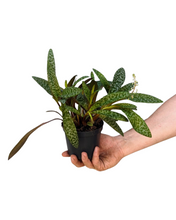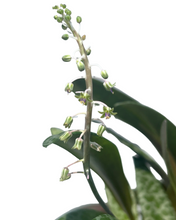Ledebouria socialis is part of the Asparagaceae family and its native range is Cape Province. It is a bulbous geophyte growing primarily in the subtropical biome. This species has mottled leaves which enables it to blend into its thicket backdrop. It has small teardrop-shaped bulbs which sit in clusters above the soi; it is one of the most widely cultivated bulbs, often favoured by cactus and succulent growers. Flowers are small, green and purple flowers born from short racemes. In its natural environment porcupines are known to dig out and eat the bulbs of several Ledebouria species.
Genus name honours botanist Professor Carl Friedrich von Ledebour. Specific epithet socialis means ‘social’ in Latin, in reference to the gregarious habit of the species.
Pot: ø 12cm.
Height: Approximately 33cm from base of pot.
Light: Grow in filtered light or bright indirect light, meaning the plant sees the sun for 0-4 hours per day - this could be through trees or a translucent curtain, it’s important for the plant to see the sky in order to thrive.
Water: Allow the majority of mix to dry out, pour water slowly over the top and allow the water to pass through the drainage holes.
There are recommendations that during winter you ought to allow the plant to dry out (dry dormancy) as it is thought that having a wet winter dormancy allows the plants to continue growing without replacing the old leaves, when spring/summer arrives, the plant doesn’t put out a new flush and won’t flower. These plants are often deciduous in winter so you may notice leaf drop.
Potting mix: Cacti or succulent potting mix is ideal. You can amend our regular potting mix with sand, pumice or horticultural grit up to 50% to improve drainage.
Fertilising: Feed every 2-3 months.
Temperature: 15˚C and above.
Humidity: 40-60%.
Ledebouria socialis is toxic, keep out of reach of pets and children.



